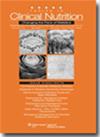The Practice of Nutrition Risk Screening, Nutrition Status Assessment, and Nutrition Support Action (NRASA) in Hospitalized Patients
IF 0.4
4区 医学
Q4 NUTRITION & DIETETICS
引用次数: 0
Abstract
The aim of this study was to investigate the prevalence of nutritional risk and malnutrition through the Nutrition Risk Screening, Nutrition Status Assessment, and Nutrition Support Action (NRASA) protocol. A total of 325 140 patients were screened, and 59 122 adults (19.31%) and 9154 children (48.38%) were considered to be “at nutritional risk.” The prevalence of nutritional risk was 18.60% (306 220 patients) based on Nutritional Risk Screening 2002 (NRS2002), and 95.62% (2687 patients) by the Mini-Nutritional Assessment Short-Form (MNA-SF). Almost 67% of 23 805 adult patients were identified to be malnourished. The prevalence of malnutrition was 47.34% (6227 patients) based upon the Subjective Global Assessment (SGA), 69.86% (2687 patients) by the Mini-Nutritional Assessment (MNA) and 97.92% (7689 patients) by the Patient-Generated Subjective Global Assessment (PG-SGA). The NRASA protocol showed that the nutritional care process can be successfully implemented to confer adequate and timely nutritional therapy for malnourished patients.住院患者营养风险筛查、营养状况评估及营养支持行动的实践
本研究的目的是通过营养风险筛查、营养状况评估和营养支持行动(NRASA)方案调查营养风险和营养不良的流行情况。共有325140名患者接受了筛查,其中59 122名成人(19.31%)和9154名儿童(48.38%)被认为“有营养风险”。基于营养风险筛查2002 (NRS2002)的营养风险患病率为18.60%(306 220例),基于迷你营养评估简表(MNA-SF)的营养风险患病率为95.62%(2687例)。在23 805名成年患者中,近67%被确定为营养不良。主观总体评价(SGA)的营养不良发生率为47.34%(6227例),微营养评价(MNA)的营养不良发生率为69.86%(2687例),患者主观总体评价(PG-SGA)的营养不良发生率为97.92%(7689例)。NRASA方案表明,营养护理过程可以成功实施,为营养不良患者提供充分和及时的营养治疗。
本文章由计算机程序翻译,如有差异,请以英文原文为准。
求助全文
约1分钟内获得全文
求助全文
来源期刊

Topics in Clinical Nutrition
NUTRITION & DIETETICS-
CiteScore
0.90
自引率
20.00%
发文量
34
期刊介绍:
Topics in Clinical Nutrition (TICN) is a peer-reviewed, quarterly journal designed as a resource for the continuing education and clinical practice of dietitians and nutritionists. Each issue addresses topics of interest primarily to dietitians and nutritionists, students and interns in professional training programs and other health care personnel involved in the nutritional care of patients. Articles include translational research reports (work that applies new knowledge to practical effect), practice projects, evidence-based literature reviews, case studies and book reviews, and articles that highlight education theory and applied research which share the tools and techniques of nutrition and dietetics education.
 求助内容:
求助内容: 应助结果提醒方式:
应助结果提醒方式:


